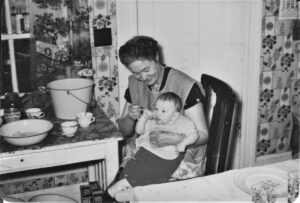The Other Mothers
 When I was a little boy, I was greedy for my mother’s attention. An only child, I lived with my parents on an eighty-acre farm. When the children at the farm across the fields were otherwise engaged, my mother was my potential playmate. She was a kind and patient woman, but she was burdened by all she had to take on: her teaching, helping my father on our farm, and raising a son when she was forty-five. Needless to say, she didn’t have as much time to give me as she may have wished, but somehow she carved out enough to play catch with me, to hit fly balls, to toss a football. As many of you know, my father couldn’t do these things because of the farming accident that cost him both of his hands.
When I was a little boy, I was greedy for my mother’s attention. An only child, I lived with my parents on an eighty-acre farm. When the children at the farm across the fields were otherwise engaged, my mother was my potential playmate. She was a kind and patient woman, but she was burdened by all she had to take on: her teaching, helping my father on our farm, and raising a son when she was forty-five. Needless to say, she didn’t have as much time to give me as she may have wished, but somehow she carved out enough to play catch with me, to hit fly balls, to toss a football. As many of you know, my father couldn’t do these things because of the farming accident that cost him both of his hands.
My mother was everything to me. She loved me, she encouraged me, she consoled me. Although my birth was accidental, I feel confident she was glad I came along. My father was, too, but our relationship was fraught, and this piece isn’t about him. It’s about my mother and all the other mothers I had when I was growing up. Almost everything I am today, I owe to my mother, but there were other women who were there to help me along my way. We never get where we are by ourselves. All sorts of people influence our lives.
So on this Mother’s Day, here’s to my grandmother—my mother’s mother—who cared for me before I was old enough to start school. I spent every Monday through Friday, when my mother was teaching, in my grandmother’s home. She introduced me to buckwheat pancakes, bologna sandwiches with mayonnaise and crumbled up potato chips between two slices of Wonder Bread, and fried hot dogs with cheese melted on them. When I was bad, as I sometimes was (My apologies for pulling up all the lettuce from your garden, Grandma, and for punching a hole through your door screen while pretending to be Mighty Mouse, and for venturing into the closed-off part of the house in winter; in my defense, I couldn’t resist the books in the front bedroom), she introduced me to the business end of her flyswatter. She was sweet and fun, and I loved her.
And here’s to my aunts whose company I loved almost as much as my mother’s. My lovely aunts who must have marveled at my arrival and who tended to me with such affection. In my rebellious teenage years, I hurt them by resisting their company. Still, they were always there to remind me I wasn’t as much of a lost cause as I surely appeared. They, like my mother, refused to abandon me, and gradually I began to believe their faith was just.
A special thanks to my friends’ mothers who welcomed me into their homes, fed me, gave me a place to sleep, celebrated me, and made me feel, if only for a time, that I was a part of their families.
My teachers as well. The women who lauded me, corrected me when I was wrong, and made me feel I could succeed. Those who, during my lost teenage years, took an interest in me, reached out, and did what they could to get me back on the right path. The college professor who took the time to teach me how to write a competent college-level essay, a skill I should have already had, out of the goodness of her heart. She went the extra mile, as did so many others. They all made a difference. I’ve never forgotten them.
And I’ve never forgotten my dear mother. Any shred of compassion I may have—any bit of empathy, any capacity for love—I owe to her. She died when I was thirty-two, so she had little chance to know the man I eventually became. If I could, I’d tell her now, everything good in me came from her. The other mothers were only there to tend what she sowed. If, as Shakespeare said, “all the world’s a stage,” the others were bit players, necessary attendants but never substitutes. My mother—my dear, dear mother—she was the leading lady all along.